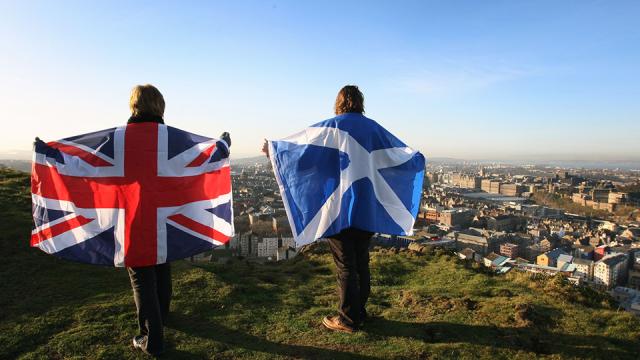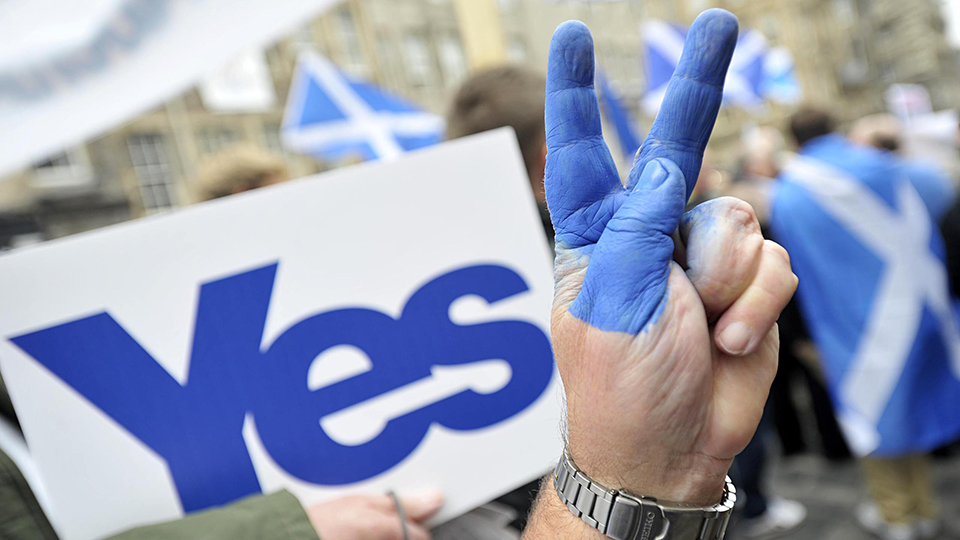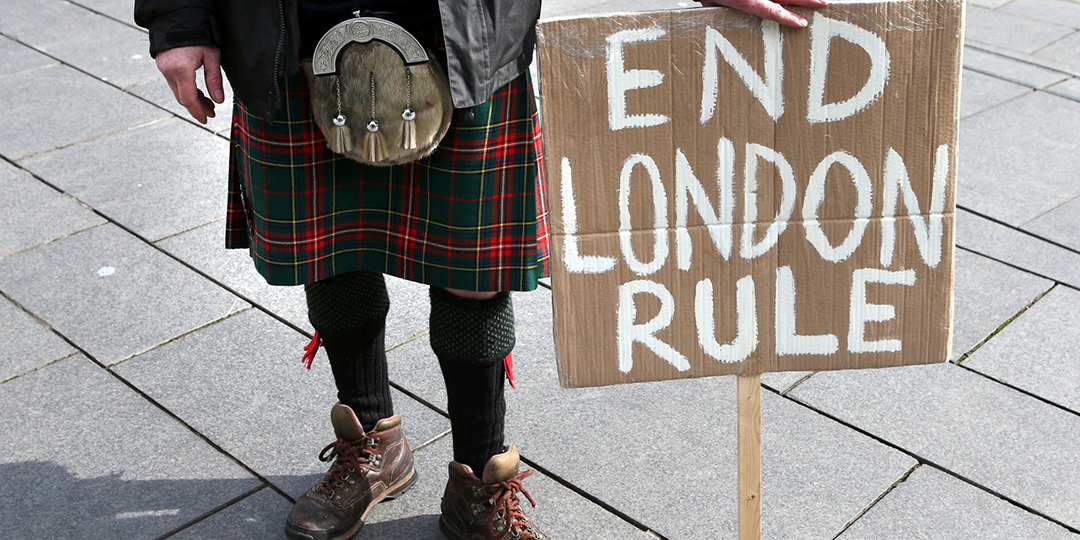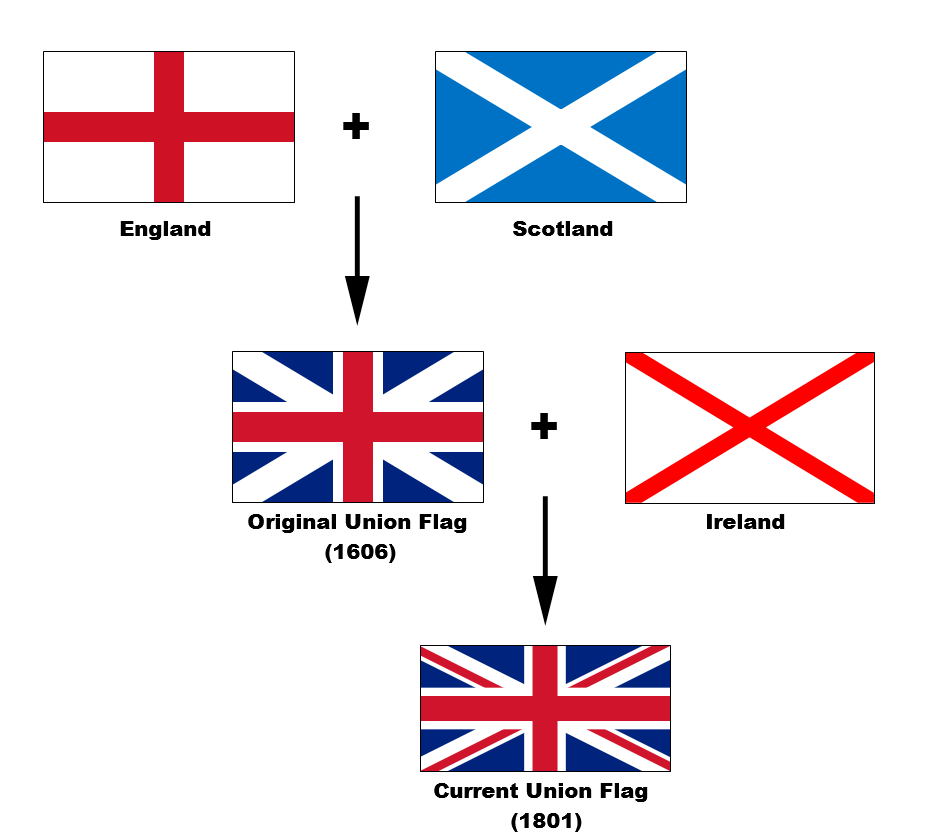
“If Scotland votes for independence, the United Kingdom in its traditional sense will become meaningless," asserts Paul Salveson, general secretary of the Hannah Mitchell Foundation which advocates greater autonomy and participatory democracy for Northern England. "There will be a need for a new political settlement within the British Isles, which must involve an independent Scotland, Wales and Northern Ireland, and crucially the Irish Republic.”
Salveson continues: “I would argue that an ‘England of regions’ would help re-balance the country and open up opportunities for each region to build strong and mutually beneficial economic, social and cultural links with the other parts of the British Isles.”
Further, he explains that Britain’s political system is broken to the point where many people in Northern England actually want to join Scotland – providing them the opportunity to escape from the austerity measures which are making the region suffer. This is also the case across the isles of Britain, where poverty and inequality are rapidly escalating as the super-rich profit immensely from a wealth redistribution exacerbated by austerity.
In his assessment, Salveson additionally describes how many northerners also want to leave behind the "corporatocracy" of London, emphasizing that there is no significant difference or direction in the three dominating Westminster parties’ policies – what has become a core aspect of the Scottish referendum debate ahead of the vote on Thursday, Sept. 18.
The View from Outside London: Yes to Independence
Wales-For-Yes is among the growing number of pro-Independence campaigns outside of Scotland. I spoke recently with Chad, a member who wished to go by his first name only – and who agreed with Salveson that a Yes for Scotland will transform the rest of the UK, or rUK.
“As it stands, the UK is London-dominated," he said. "It has the largest spending per capita and largest investment, while the rUK is suffering.”
Like Scotland, Chad said, a Wales free from London would likely shift direction away from neoliberal policies, due to Wales's political consensus that leans more progressive. In Cornwall, the southwest peninsula of the UK, I heard similar points about London’s over-bearing influence and how its corporate finance-driven policies impact the region.
"Cornwall suffers from the effects of centuries of marginalization and ridicule that are very visible,” says resident Hannah Slydel. “They can be seen in the high unemployment rates, widespread drug and alcohol abuses and high rates of mental health issues.”
Rejecting London's Global Dominance
The City of London not only exerts massive power over the rUK; as a center of global financial capital it tends to dominate the rest of globe as well. The city, for instance:
-
Acts as hub to half the world’s tax havens.
-
Provides one of the key spaces where financial fraud and malpractice are devised and carried out. (The LIBOR rate-rigging scandal is but one example.)
-
Offers a focal point and profits greatly from the global arms industry.
-
Hosts vulture funds that prey on countries' odious debt.
-
Leads investments in fossil fuels, including unconventional fuels like tar sands.
-
Enables speculation and drives up the price of essentials such as food.
This list is illustrative rather than comprehensive. It is fair to suggest that beyond the rUK’s shores, London is destructive to both people and the planet, in many cases working hand in hand with other centers of financial power such as New York and Frankfurt.
One rUK Solution: Devolution
To remedy Britain’s democratic crisis, each region is calling for further devolution of powers away from London. Chad told me that many Welsh people want a Parliament, with similar powers to the Parliament that were reinstated in 1998. The Hannah Mitchell Foundation and Mebyon Kernow from Cornwall are two leading organizations calling for regional assemblies. If successful, these regions would elevate in autonomy to the current level enjoyed in Wales.
I a reciprocal sense, any devolution of power to the regions and countries lessen the power of the City of London. Looking to the future, Chad said he foresees the possibility that Wales may even want to go it alone – particularly if Scotland blazes ahead with aprogressive transformation to real democracy.
And while the Scottish referendum is bolstering such calls for greater autonomy from London, each regional movement is demanding respect in its own right – growing from its own momentum. A Wales Assembly report published in the spring called for the country to take greater control over its public sector, including the justice system and transport and energy policies.
In a landmark decision one month after the report, Cornish people were recognized as an ethnic minority. They now hold the same protections in law as the ethnic Celtic peoples of Wales, Ireland and Scotland.
Slydel said it's vital for Cornish people to reclaim this identity. “Growing up, I internalized a lot of the economic and cultural shame associated with Cornwall. This is happening to large numbers of young people who feel they need to leave Cornwall and reject aspects of their identity. This deprives Cornwall of its people, so it is crucial our ethnicity is recognized.”
Further Seismic Cracks In the "United Kingdom"
“I do not think there has ever been such a need for a shift in the political situation as we need now,” said Tina Rothery, a local resident and Grandmother from Blackpool who was involved in the recent Grandmother-led, UK-wide direct action against government and business plans to frack her local area – defined as a gateway for the rUK to be fracked.
Rothery continued: “The corporations have a complete stranglehold on our democracy. We need to urgently define what democracy means. There is virtually no participation, save for voting once every four years. With the narrow choices on offer and way our voting works, I do not even think this system is democracy. There is virtually no difference between the fracking business and the government.”
Her corporatocracy point seems embodied in people like Lord Browne, who is chairman of the fracking company Cuadrilla while also holding a senior unelected government position with oversight on his own fracking industry – an example of business-government collusion that is by no means isolated.
Fracking is, in fact, an issue that has found absolute political consensus between the major parties. To challenge this, protests are planned against the opposition Labour Party Conference on Sunday, Sept. 21.
Equally, the Labour Party, considered the main opposition to the conservative-led Coalition under David Cameron, supports austerity, privatization and cuts to public services, eroding the very safety nets that it installed after the Second World War. It does not offer any challenge to the Trans-Atlantic Trade and Investment Partnership, or TTIP, which has been neatly summarized as a “Charter for deregulation, an attack on jobs, an end to democracy.”
On issues of finance, Labour has continued the light-touch regulation of the City of London begun by Margaret Thatcher, which was blamed for creating the global financial meltdown. It is meanwhile criticized for pushing anti-immigrant policies in tandem with instigating and supporting aggressive wars, particularly in Iraq, and not challenging Britain’s nuclear weapons program or military industrial complex.
Looking ahead to next week's vote, the Scottish referendum may shatter the reigning TINA (there is no alternative) ideology and replace it instead with TINC – there is no continuum. And if the status quo between London and the rUK changes, as many anticipate it will, London’s tempered and reduced power may not only have implications for the isles known until now as Britain, but for the rest of the world that lies beyond them.
3 WAYS TO SHOW YOUR SUPPORT
- Log in to post comments
















